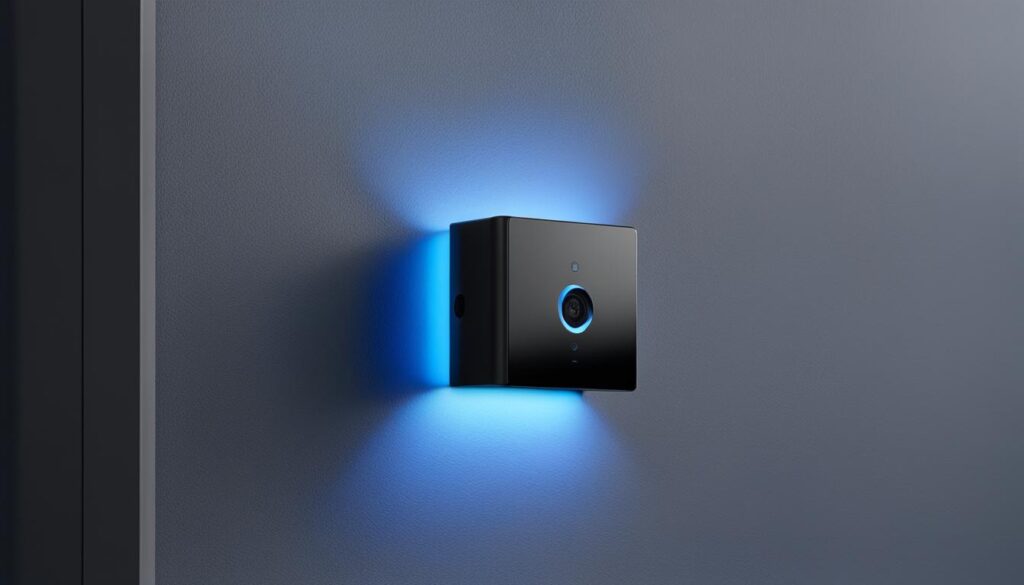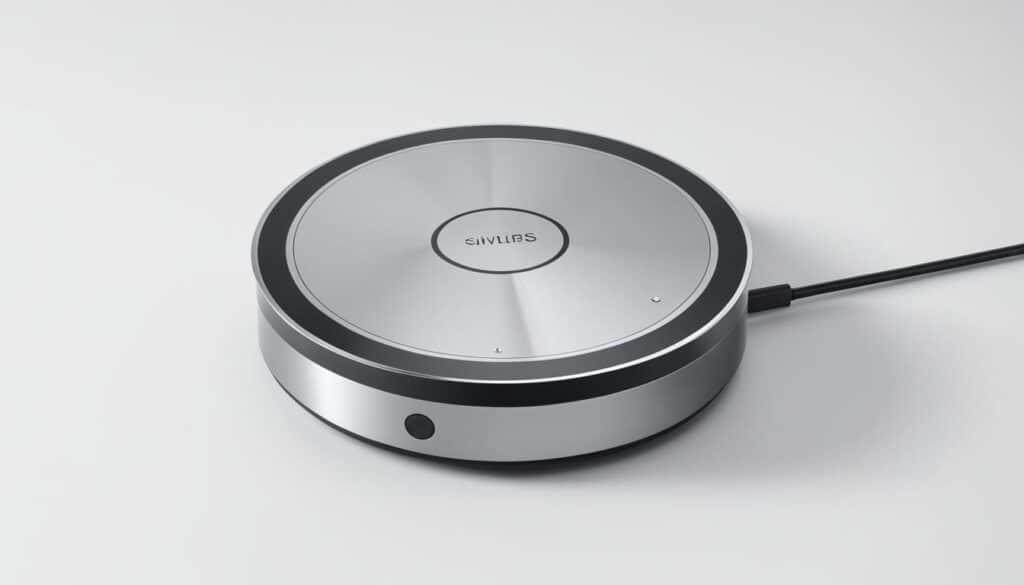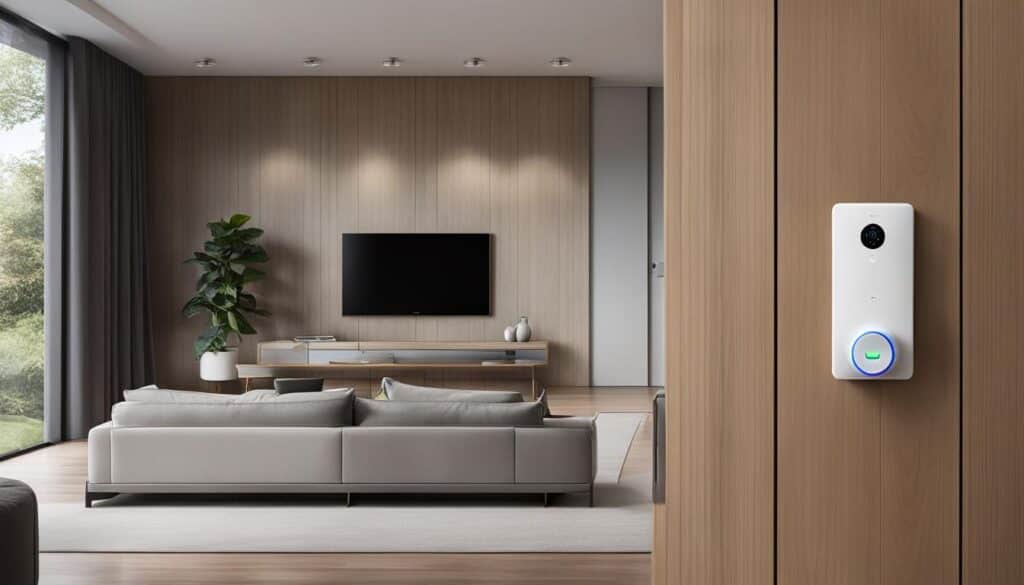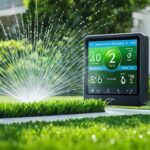As a beginner in the world of home automation, I know how exciting it can be to explore the possibilities that smart technology brings to our daily lives. One important aspect of creating a smart home is integrating smart sensors into our living spaces. These sensors play a crucial role in monitoring and controlling various aspects of our homes, making our lives easier and more convenient.
When starting with home automation, it’s essential to understand the key smart sensors that can enhance our daily routines. In this article, we will explore the essential smart sensors suitable for beginners like you and me. By incorporating these sensors into your home automation setup, you can enjoy enhanced security, energy efficiency, and overall comfort.
Table of Contents
Key Takeaways:
- Smart sensors are vital for home automation beginners.
- Door and window sensors enhance home security.
- Motion sensors provide security and energy-saving capabilities.
- Temperature and humidity sensors optimize comfort and energy efficiency.
- Water leak sensors help prevent water damage.
Door and Window Sensors
When it comes to smart security for your home, door and window sensors are essential components. These sensors play a fundamental role in enhancing the safety of your living space, providing an extra layer of protection to keep you and your loved ones secure.
Door and window sensors are designed to detect when a door or window is opened or closed. As soon as any unauthorized access is detected, these sensors send immediate alerts to your smartphone or trigger an alarm system, enabling you to take swift action. With these sensors in place, you can have peace of mind knowing that you will be promptly notified if someone enters your home without permission.
In addition to their primary function of enhancing security, some door and window sensors also include temperature and humidity sensors. This additional capability allows for monitoring and maintaining optimal environmental conditions in your living space. By keeping track of temperature and humidity levels, these sensors contribute to creating a comfortable and healthy home environment.
Investing in door and window sensors is a smart choice for any homeowner looking to prioritize their home security. With their seamless integration into a smart security system, you can have full control over the security of your home, even when you’re on the go.
Benefits of Door and Window Sensors:
- Enhanced home security
- Real-time alerts and notifications
- Immediate action against unauthorized access
- Environmental monitoring capabilities
- Contribution to a comfortable and healthy living space
Top Door and Window Sensors
| Brand | Model | Features | Price |
|---|---|---|---|
| Brand A | Model X | Compatible with smartphone apps, temperature and humidity sensors | $XX.XX |
| Brand B | Model Y | Wireless connectivity, customizable alerts | $XX.XX |
| Brand C | Model Z | Long battery life, easy installation | $XX.XX |
Table: A comparison of top door and window sensors featuring different brands, models, features, and prices.
Motion Sensors
Motion sensors are versatile smart sensors that provide both security and energy-saving benefits. These sensors are designed to detect movement within their range and can trigger various actions to enhance the functionality of your home automation system.
One of the primary uses of motion sensors is to control lighting. When integrated with smart lighting systems, motion sensors can automatically turn on lights when they detect movement and turn them off when the area is no longer occupied. This feature is particularly useful in areas like hallways, entrances, and outdoor spaces, where lights are often inadvertently left on.
Motion sensors also play a crucial role in enhancing home security. They can be used to activate security cameras or trigger alarm systems when motion is detected, providing you with real-time notifications and helping you monitor and protect your property.
Furthermore, motion sensors contribute to energy savings by ensuring that lights and other appliances are only activated when needed. By automatically turning off lights in unoccupied areas, motion sensors help reduce electricity consumption and lower energy costs.
With their ability to enhance security, improve convenience, and optimize energy usage, motion sensors are an essential addition to any smart home automation system.
Benefits of Motion Sensors:
- Enhanced security: Motion sensors detect unexpected movement, providing a heightened sense of security.
- Convenient automation: Lights and appliances can be automatically controlled based on occupancy, improving convenience and energy efficiency.
- Cost savings: By reducing unnecessary energy consumption, motion sensors help lower electricity bills.
Investing in motion sensors is a smart choice for homeowners looking to enhance security, increase energy savings, and enjoy the convenience of automated lighting control.
“Motion sensors offer a proactive approach to security and energy management, empowering homeowners with real-time monitoring and control.”
When planning your smart home automation setup, consider incorporating motion sensors in areas where they can provide the most benefit, such as hallways, entrances, and outdoor spaces.
Discover the power of motion sensors and experience the convenience, security, and energy savings they bring to your smart home.
| Key Features of Motion Sensors | Common Use Cases |
|---|---|
| Detection of movement within a specified range | Triggering lights based on occupancy |
| Adjustable sensitivity settings | Activating security cameras |
| Integration with smart home systems | Alerting homeowners of unexpected movement |

Temperature and Humidity Sensors
Temperature and humidity sensors play a crucial role in maintaining a comfortable and healthy living environment. These sensors provide real-time data on temperature and humidity levels, allowing users to optimize climate control for maximum comfort and energy efficiency.
By monitoring temperature and humidity in different areas of the home, these sensors enable homeowners to make informed decisions regarding their HVAC system, smart thermostats, or humidifiers. With the ability to adjust settings based on accurate data, users can create an ideal living space while minimizing energy consumption.
Temperature and humidity sensors are particularly beneficial in regions with extreme weather conditions, as they provide insights into any fluctuations that may impact indoor comfort. They are also invaluable for individuals with respiratory conditions, as they enable the maintenance of specific humidity levels for optimal respiratory health.
Below is a comparison table showcasing the features of temperature and humidity sensors from popular brands:
| Brand | Key Features | Price |
|---|---|---|
| Brand A | Real-time temperature and humidity monitoring, compatible with smart home systems, mobile app integration | $50 |
| Brand B | Wireless connectivity, customizable alerts, historical data analysis | $40 |
| Brand C | Accurate sensors, energy-saving recommendations, sleek design | $60 |
Investing in temperature and humidity sensors provides a foundation for optimal climate control in your home. With their ability to monitor and adjust indoor conditions, these sensors contribute to a comfortable and healthy living environment.
Embrace the power of temperature and humidity sensors to create your ideal climate. Start enjoying the benefits of efficient climate control today!
Water Leak Sensors
Water leak sensors are essential devices for homeowners looking to detect and prevent water damage in their homes. These sensors are strategically placed near appliances, pipes, or areas prone to leaks, such as bathrooms or basements, to provide an early warning system for potential water leaks. By detecting even the smallest water leaks, these sensors can prevent major flooding incidents that can lead to costly repairs and damage to your property.

When a water leak sensor detects moisture or a water leak, it immediately sends an alert to the homeowner, notifying them of the problem. This prompt notification allows for immediate action to be taken, minimizing potential damage and reducing the risk of mold growth or structural issues. With the ability to detect and alert homeowners about water leaks, these sensors play a crucial role in preventing water damage and preserving the integrity of your home.
Water leak sensors are particularly valuable for homeowners who travel frequently or have properties that are vacant for extended periods. In such cases, the sensors act as a remote monitoring system, providing peace of mind and ensuring that any potential water leaks are addressed swiftly, even when the homeowners are away.
By investing in water leak sensors, homeowners can take proactive steps to prevent water damage, saving time, money, and the hassle associated with extensive repairs. The peace of mind provided by these sensors is invaluable, knowing that your home is protected from the devastating effects of water leaks.
Smoke and Carbon Monoxide Detectors
When it comes to home safety, smoke and carbon monoxide detectors are absolutely essential. These smart sensors continuously monitor the air quality in your home and provide critical alerts in the event of smoke or dangerous levels of carbon monoxide.
Having smoke and carbon monoxide detectors installed in your home can make all the difference when it comes to protecting your family and property. These devices can save lives by providing early warnings and allowing you to take immediate action in case of emergencies.
A smoke detector is designed to detect the presence of smoke particles in the air. It emits a loud alarm when smoke is detected, giving you precious time to evacuate and call for help. Smoke detectors are especially important in areas near kitchens, bedrooms, and living rooms, where the risk of fires is higher.
Carbon monoxide is a silent killer that can be produced by malfunctioning appliances or insufficient ventilation. Carbon monoxide detectors are specifically designed to monitor CO levels in your home and provide alerts if they reach dangerous levels. Since carbon monoxide is odorless and colorless, having a detector is vital to ensure the safety of your household.
One of the greatest advantages of smart smoke and carbon monoxide detectors is their ability to be connected to a smart home system. This allows for remote monitoring and notifications, so you can be informed about any emergencies even when you’re away from home. Knowing that you can stay informed and take action no matter where you are provides a valuable sense of peace of mind.
It’s worth noting that smoke and carbon monoxide detectors are often required by building codes. This means that having these devices installed is not only important for your own safety but also a legal requirement in many areas.
Key Features of Smoke and Carbon Monoxide Detectors:
- Continuous air quality monitoring
- Alerts for smoke and dangerous levels of carbon monoxide
- Ability to connect to a smart home system
- Remote monitoring and notifications
- Compliance with building codes
Investing in smoke and carbon monoxide detectors is a crucial step towards ensuring the safety of your home and loved ones. Don’t take any chances when it comes to home safety—make sure you have these life-saving devices properly installed and regularly maintained.
Light Sensors
Light sensors, also known as ambient light or photocell sensors, are an essential component of a smart lighting system. These sensors automatically adjust the lighting levels based on the amount of natural light available, allowing for optimized energy efficiency and greater control over your home’s lighting.
When integrated with smart lighting systems, light sensors enable a concept known as daylight harvesting. This practice involves harnessing the natural light during the day and reducing the reliance on artificial lighting. By dimming or turning off lights in rooms with sufficient natural light, light sensors contribute to significant energy savings and a more sustainable home environment.
Light sensors are particularly beneficial in rooms with large windows or outdoor spaces, where they can accurately detect and respond to changes in natural light levels. In these areas, light sensors can seamlessly adjust the brightness and intensity of the artificial lighting, ensuring a comfortable and well-lit environment while reducing energy consumption.
Benefits of Light Sensors:
- Energy Efficiency: Light sensors help minimize energy waste by automatically adjusting artificial lighting based on the availability of natural light. This translates to reduced energy consumption and lower electricity bills.
- Improved Comfort: By maintaining optimal lighting levels, light sensors create a more comfortable and visually pleasing environment for occupants.
- Enhanced Sustainability: By reducing the reliance on artificial lighting, light sensors contribute to a more sustainable and eco-friendly home, minimizing the carbon footprint.
- Convenient Automation: Light sensors work seamlessly with a smart home system, allowing for efficient automation and effortless control of lighting throughout the day.
With the increasing focus on energy efficiency and sustainable living, incorporating light sensors into your smart home setup is a wise investment. Experience the benefits of daylight harvesting, improved energy efficiency, and enhanced comfort by integrating light sensors into your home automation system.
Conclusion
Incorporating smart sensors into your home automation setup can revolutionize your daily routine, elevate your security measures, and reduce energy consumption. As a beginner in the world of home automation, it is essential to start with the foundational smart sensors that will lay the groundwork for an intelligent and efficient home.
In particular, door and window sensors provide a comprehensive security solution, alerting you to any unauthorized entry. Motion sensors not only enhance security but also help conserve energy by automating lights and appliances based on occupancy. Temperature and humidity sensors allow you to create the ideal indoor climate while conserving energy.
Water leak sensors act as the first line of defense against potential water damage, sending alerts that enable you to take immediate action. Smoke and carbon monoxide detectors are crucial for ensuring the safety of your home and loved ones. Lastly, light sensors optimize energy usage by adjusting your lighting system based on the natural light available.
By starting with these essential smart sensors, you are building a solid foundation for a truly intelligent home. As you become more familiar with home automation and your needs evolve, you can add more sensors to further enhance your home. Don’t miss out on the opportunity to upgrade your living space with these indispensable smart sensors and experience the countless benefits they bring.
FAQ
What are smart sensors?
Smart sensors are key components of a modern home automation system that allow users to monitor and control various aspects of their living space.
What are door and window sensors used for?
Door and window sensors are fundamental smart sensors for home security. They can detect when a door or window is opened or closed, providing an extra layer of security and sending alerts to the homeowner’s smartphone or triggering an alarm system.
How can motion sensors be used?
Motion sensors are versatile smart sensors that can be used for security and energy-saving purposes. They detect movement within their range and can trigger actions such as turning on lights, adjusting thermostat settings, or activating security cameras.
Why are temperature and humidity sensors important?
Temperature and humidity sensors are essential for maintaining a comfortable and healthy living environment. They monitor the temperature and humidity levels in different areas of the home, allowing users to optimize comfort, energy efficiency, and HVAC systems.
What is the purpose of water leak sensors?
Water leak sensors are crucial for early detection and prevention of water damage. They are typically placed near appliances, pipes, or areas prone to leaks, such as bathrooms or basements, and send alerts to the homeowner when a leak is detected.
Why are smoke and carbon monoxide detectors necessary?
Smoke and carbon monoxide detectors continuously monitor the air quality and provide alerts in the event of smoke or dangerous levels of carbon monoxide. They are vital for ensuring the safety of your home and family.
What are light sensors used for?
Light sensors, also known as ambient light or photocell sensors, automatically adjust lighting levels based on the amount of natural light available. They can be used in conjunction with smart lighting systems to optimize energy efficiency and reduce reliance on artificial lighting.


